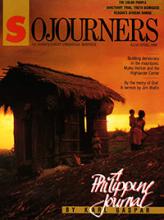In early 1985, after being released from prison where he served 22 months on charges of political subversion, Filipino church worker Karl Gaspar began to consider what would be the next step on his political and spiritual journey. He decided to immerse himself for six months in the lives of the people of the island of Negros, one of the poorest areas of the Philippines.
While in Negros, Gaspar kept a journal in which he reflected on his personal experiences and those of the people he came to know and love. Explaining in the foreword to his journal that names of places and persons had been changed, Gaspar states, "We all know why this is necessary."
The journal was distributed to Gaspar's close friends, including Jim Wallis, and contains both rich and disturbing reflections. We offer an excerpt from the journal here. --The Editors
JUNE 13
THE BACOLOD AIRPORT was jam-packed at the time of my arrival from Manila. It was high noon. A pleasant breeze greeted us as we alighted from the plane, and I was filled with excitement.
Up there in the clouds I had thought, "Negros, here I come." Negros meant a new life, a new opening. I kept asking myself, "Is this the right choice?" Perhaps. "Is it God's hand that is leading me to this direction? Or is it only a temporary escape?" But how can one escape life's realities and challenges in a place like Negros? No, this is not an escape. It is a new sojourn.
Read the Full Article

